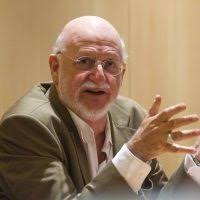Malaysia's fateful national elections
On Tuesday 20 February, the Institute welcomed Clive Kessler – Emeritus Professor of Sociology and Anthropology at the University of New South Wales – back to the Glover Cottages to discuss the upcoming general elections in Malaysia. Mr Kessler delineated the current political situation in Malaysia, and discussed the rise of Malay-Islamic Supremacist ideology, propagated by the ruling party: The United Malays National Organisation (UNMO).
A great deal of discussion centred on the legacy of the 2013 election, which saw the incumbent coalition – led by UNMO – lose the popular vote, but win enough seats to form government, in the “first past the post” electoral system; a relic of the colonial era. Despite allegations of gerrymandering and fraud, the result of the election was upheld, and the government has since consolidated its power and “Islamic supremacy”. This strengthening has been complemented by the opposition’s significant loss of power. The opposition, led by Anwar Ibrahim, has been demonised and ostracised by the government as ‘anti-Islamic’, which has led to its loss of momentum. The opposition party suffered another blow when revered leader, Ibrahim, was imprisoned again in 2015, having been jailed previously in 1999.
Thus, the government enters the fourteenth election with no strong contenders. Pakatan Harapan – the opposing coalition – is now led by former 92-year-old Prime Minister Mahathir Mohamed. While respected, Mohamad does not pose a genuine challenge for the incumbent Prime Minister, Najib Razak.

Mr Kessler concluded his talk with the declaration that Malaysia has a “bright future in its past, no longer”, and a somewhat bleak outlook heading into the elections, where he expects UNMO to, once again, be victorious. Looking into the future, Mr Kessler iterated his belief of the inevitability of a future Islamic State in Malaysia. For a country that has always touted itself as a progressive Islamic nation, Mr Kessler believes it is time for the international community to recognise this as “delusional”. The AIIA would like to thank Mr Kessler for his insights, on a topic that is especially pertinent in the context of the international debate about Islamic governance. As one of Australia’s neighbours in the South Pacific, the political situation in Malaysia has additional significance for the stability of our region. Thus, we shall continue to follow the outcome of the election with great interest.
Report by Diana Lambert
AIIA NSW Intern